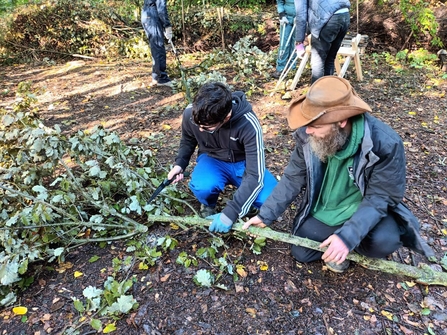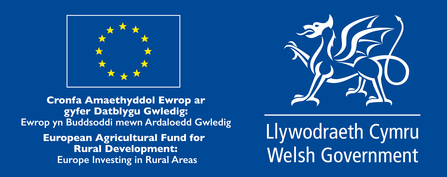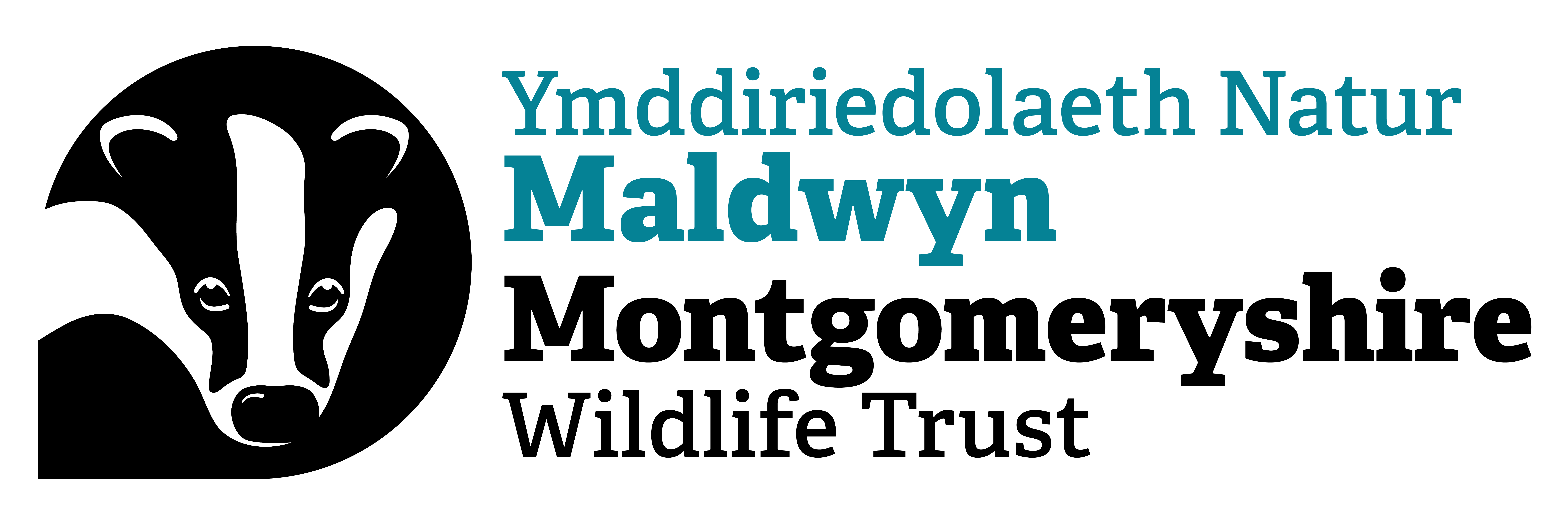The ecotherapy programme is a partnership between Montgomeryshire Wildlife Trust (MWT), Powys Teaching Health Board (PTHB) and Cardiff Metropolitan University, and is designed to improve people’s mental health and wellbeing through reconnecting them with nature and their environment.
Pioneering Powys ecotherapy programme wins national award

One of the young Wild Skills Wild Spaces participants learns how to safely coppice trees at Severn Farm Pond Nature Reserve © MWT
Wild Skills Wild Spaces incorporates a range of outdoor activities, from wildlife walks and food growing to bushcraft such as fire lighting and green woodworking. The free, inclusive ecotherapy sessions are delivered by a dedicated, trained team at various MWT nature reserves and other local wildlife-rich sites. As well as helping boost participants’ wellbeing, the project aims to enable them to make a positive change for wildlife in their communities.
The innovative nature for wellbeing programme caught the attention of NHS Forest, a project researching links between health and the environment, because it empowers young people and adults who wouldn’t typically engage with prescribed therapeutic interventions or outdoor activities.
Wild Skills Wild Spaces was devised by MWT Head of Health and Wellbeing Carla Kenyon, who took inspiration from Lancashire Wildlife Trust’s ‘Myplace’; the scheme used ‘5 ways to wellbeing’, which are connecting with nature, being active, taking notice, learning and giving back, to boost mental health. Findings from that 2019 project showed 100 percent of case studies felt happier, more confident and less angry; some even found employment as a result of their new skills and increased confidence.
Funded by the Welsh Government, WSWS launched in June 2021 and already has around 50 people aged 12 to 75 involved with it each week. Participants are referred from primary and secondary healthcare providers, such as GPs and mental health services, and programme attendance is at 80 percent. The project is currently funded up to 2023 and, if it’s as successful as hoped, it could pave the way for similar schemes to be rolled out across Wales.
My team and I are delighted the programme has received recognition for the work it’s doing to bridge the gap between wellbeing and exposure to the natural world. Getting out in nature and embracing our ever-changing seasons, whatever the weather, is vital for our bodies and minds and reminds us how to live in the present moment. Regular exposure to nature and wildlife is particularly important for those who suffer with poor mental health, helping to ease anxiety and combat depression.Montgomeryshire Wildlife Trust
I am really pleased the Wild Skills Wild Spaces project has been nationally recognised as an innovative way of interacting with both the NHS and its local community in natural green spaces, which we are fortunate to have as a Wildlife Trust. It has been a lot of hard work but, with a great team now delivering on the ground, I am really proud of what we have collectively achieved. The hope is that WSWS can become a blueprint for other health boards and third sector organisations to easily adopt and roll out across Wales.Montgomeryshire Wildlife Trust
We were particularly impressed with Wild Skills Wild Spaces due to its focus on inclusivity, and efforts to reach people who may not normally engage with nature and outdoor activities. The number of partners involved in this project has made it wide-ranging – giving it access to nature reserves, involving mental health staff, opening it up to clinical and non-clinical participants and offering practical sessions in an exciting variety of activities, from bushcraft to cooking. Finally, the ‘friends of’ groups ensure the sustainability of the project in the long term, keeping former participants engaged and supported. It really is an outstanding project.Centre for Sustainable Healthcare (which co-ordinates the NHS Forest project)

The Sustainable Management Scheme (SMS) is delivered by the Welsh Government Rural Communities - Rural Development Programme 2014-2020, which is funded by the European Agricultural Fund for Rural Development and the Welsh Government.
Mae’r Cynllun Rheoli Cynaliadwy (SMS) yn cael ei gyflwyno gan Cymunedau Gwledig Llywodraeth Cymru – Rhaglen Datblygu Gwledig 2014–2020, sy’n cael ei hariannu gan Gronfa Amaethyddiaeth Ewrop ar gyfer Datblygu Gwledig a Llywodraeth Cymru.
